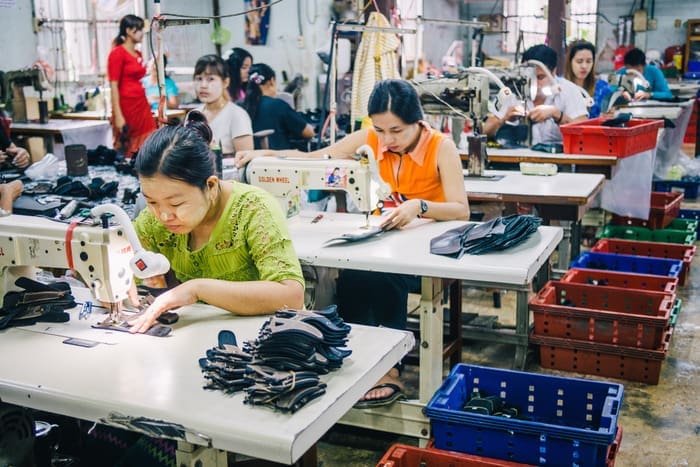The controversial practices that lie behind the production of fast fashion clothing are increasingly under scrutiny. Growing awareness around the impact this sector is having on the planet is also leading consumers to turn to sustainability, especially amid the Covid crisis. Is this the end of fast fashion?
Fast fashion was booming in the early 2000s when consumers connected with Primark’s luminous mesh clothing and chunky plastic hoop earrings, and as the likes of Topshop, H&M and Zara embarked on ambitious expansion schemes around the world.
However, in more recent years ethics and corporate transparency in fast fashion has been the topic of numerous debates – especially since the Covid-19 pandemic swept the world in March this year.
The sector has been seeing an increase in calls for transparent corporate practices as well as sustainable offerings from retailers that were once the mascots for fast fashion. Retailers have also had to deal with a domino effect on the high street – where competition led to many of them “greenwashing” to appear ethical.
The term “greenwashing” was coined in the 1980s by environmentalist Jay Westerveld to describe retailers which grossly overstate the environmental or ethical benefits of their products and services.
Despite sustainability already being one of the buzzwords in retail before the pandemic, GlobalData predicted in April that Covid would put sustainability concerns on hold as retailers focus on the battle for survival.
Nonetheless, a major reason why Brits were increasingly avoiding fast fashion was because its effects range from low-paid or poorly-treated workers to environmental destruction through burning excess clothes or eye-watering amounts of apparel sent to landfill.
Oxfam urges retailers to ensure the jobs of garment workers are “fair and safe – and that people are paid a living wage for the work that they do”.
“It’s heartening to see that shoppers are moving away from fast fashion and are making more sustainable choices,” an Oxfam spokesperson told Retail Gazette.
“The shift in shopping habits – buying second-hand clothing instead of new – is particularly exciting because it extends the life of clothing and prevents it from going to landfill.
“Consumers may be shifting towards longer lasting products to mitigate the negative effects fast fashion has on the planet.”
Oxfam’s research found that new clothes bought in the UK produce more carbon emissions per minute than driving a car around the world six times.
The organisation elaborated that despite Brits’ changing behaviour, “there’s much more work to be done”.
“The textile industry accounts for eight per cent of the world’s greenhouse gas emissions –that’s more than international aviation and shipping combined,” Oxfam’s spokeserson added.
“This could rise by more than 60 per cent by 2030. What’s more, 11,000 items per week in the UK are sent to landfill.”
A few months ago, online fast fashion giant Boohoo grabbed headlines after being accused of modern slavery for paying its garment workers in Leicester as little as £3.50 an hour. The factory in Leicester was also operating during a localised lockdown, allegedly without additional hygiene or social distancing measures in place.
“The plastic crisis has raised awareness of the UK’s growing throw-away culture”
As a result of the scandal, Next and Asos were among the first companies to stop selling Boohoo items on their websites, saying they were looking for an “answer”. The scandal has led to Boohoo shares dropping by 20 per cent and an investigation being launched.
Mark Childs, managing consultant at Capgemini, argued that while the issue of plastic has been on consumers’ radar in recent years, “it was only a matter of time before consumers began to question other industries through the same lens”.
“The plastic crisis has raised awareness of the UK’s growing throw-away culture,” he said.
“Fashion as an industry, has in the past operated behind closed doors, but increased access to information has provided consumers with a newfound visibility on the impact of the fashion industry in general.
“Consumers are becoming increasingly aware of the vast amount of natural resources required to produce one t-shirt and the quantity of clothing that ends up in landfill each year.
“As a result, they are looking for ways to reduce their consumption levels.
“Customers not only expect their brands to represent their beliefs and values, but to be authentic and transparent.
“This transparency comes with a large caveat however, consumers are becoming increasingly rigorous in their due diligence when deciding who to transact with.”
In December, market research firm Ipsos found that a colossal 74 per cent of Brits agreed that fashion retailers should take more responsibility for what happens in their manufacturing processes, “and ensure it is done in an environmentally friendly way”.
While being a mid-market or premium fashion retailer or brand is no guarantee of sustainable or ethical practices, these businesses could use their position of power to invest in their sustainable and ethical practices and encourage customers to buy fewer, longer-lasting products.
An example of this is Selfridges’ recent launch into product repair and resale as part of plans to radically improve its sustainability. The luxury department store said it was also exploring a move into “refill and rental” of some products as part of a commitment to change how customers shop in its stores by 2025. The proposals are part of Selfridges’ Project Earth sustainability initiative.
However, experts told Retail Gazette that the fast fashion sector still has long way to go to combat unethical practices.
Natasha Parker, head of consumerism at environmental charity Global Action Plan, argued that the retail sector was nowhere near eradicating the range of unethical and unsustainable practices in fast fashion.
“There are vast amounts of money to be made so fast fashion will likely be the dominant model until retailers start putting the planet before profits,” she explained.
Parker added that it was going to be a big step because retailers will need to fundamentally change their model if they are to stick to the carbon budgets, especially since “fashion has a higher carbon footprint than aviation and shipping combined”.

Rob Webbon, chief executive Presca Teamwear, said the fast fashion model was “an environmental and social disaster”.
“It’s a downward spiral of ever-cheaper clothing, made in ever higher volumes to drive a profit from dwindling margins,” he told Retail Gazette.
“When the only drivers are profit and rapid turnover of clothing, the environmental and social impact is brushed under the table and completely discounted.”
Fashion consultant Elizabeth Stiles argued that while sustainable offerings could kill off fast fashion, it would likely be a slow process. She said retailers have the responsibility of making consumers understand why some products cost more than others, as many have become accustomed to fast and cheap clothing.
According to Stiles, fast fashion giant Primark is currently “making big efforts” to change its model. Last year, the retailer committed to training 160,000 cotton farmers in China, India and Pakistan to teach them environmentally-friendly farming practices in a move to further its sustainability methods. The target is part of Primark’s sustainable cotton programme, which aims to use 100 per cent sustainable cotton in all its product categories.
“Primark’s business model is based on high volumes and low margins,” Stiles said.
“It would suffer if its quantities need to be drastically reduced based on people buying less, as this is one of the key factors to the retailer getting the low prices.”
Stiles went on to highlight that Boohoo produces much smaller quantities but very frequently and often in poor working conditions.
“It’s time for some radical changes to be made for sure,” she added.
The UK fashion market is predicted to become the worst hit sector due to the pandemic, with GlobalData predicting a £14 billion decline. However, those predictions came in April, at a time when the UK was in full lockdown.
Nonetheless, fashion retailers – especially fast fashion chains – will need to evolve in the current market. There’s no denying that the 2020 consumer is more aware of their buying decisions and what impact they, as an individual, have on the environment or factory workers. For that reason, fast fashion retailers must be ready for change.

